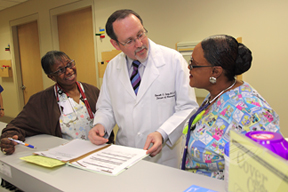A new class of medicines known as biologics is promising relief to patients suffering from painful autoimmune diseases, but the short- and long-term health consequences and appropriate use of those medicines are concerns that have yet to be fully defined.
 |
| Patient care techs Patricia Butts (left) and Carmen Underwood (right) review a patient report with Kenneth Saag, director of the Center for Education and Research on Therapeutics (CERTs). |
“The government is very eager under the new administration to better understand the comparative effectiveness of drugs, devices and biologics and ultimately to try to use that information to help rein in some of the large costs that are associated with drug use in the United States,” says Kenneth Saag, M.D., director of CERTs and a professor in the Division of Clinical Immunology & Rheumatology.
“These medicines have been remarkably efficacious and clinically effective in improving conditions like rheumatoid arthritis. It has been shown that disease inflammation and severity can be lessened with the use of these agents,” Saag says. “But when do we use them? When is it appropriate to consider medicines that in some cases cost more than $1,000 a month and may have possible short- and long-term health and safety concerns? That’s what we want to find out.”
What are biologics?
Biologics are genetically engineered therapies that target immune processes that contribute to inflammation present in rheumatoid arthritis, inflammatory bowel disease, psoriasis and other autoimmune conditions in which the body is reacting abnormally to itself.
An estimated 46 million adults in the United States have been diagnosed with some form of arthritis, rheumatoid arthritis, gout, lupus or fibromyalgia, according to the National Center of Chronic Disease Prevention and Health Promotion. The National Institutes of Health estimates between 5.8 and 7.5 million Americans have psoriasis. Other statistics show that 5 million Americans suffer from inflammatory bowel disease, and more than 500,000 suffer from Crohn’s disease.
Saag says these diseases can be very painful and in some cases disabling — sometimes to the point of shortening life expectancy — and they are treated aggressively. Biologics are effective, so they have become a premier treatment for serious inflammatory conditions and require a proper safety study.
The list of biologics also continues to grow, adding to the reasons that CERTs’ study is timely. “We’re able to look at some of the newer agents and understand their safety in ways that hasn’t been established,” Saag says.
AHRQ, the government agency responsible for conducting research on safety and comparative effectiveness of drugs, devices and biologics, awarded UAB the grant. CERTs is one of 14 centers funded by the agency.
The research is a collaborative effort with other centers, including Brigham and Women’s Hospital in Boston, Kaiser Permanente’s Division of Research in California, Oregon Health and Science University in Portland, the University of Massachusetts Medical Center in Worcester, the University of Pennsylvania in Philadelphia and Vanderbilt University.
“These teams of researchers have a great deal of experience in conducting collaborative research on the safety of drugs,” Saag says.
Gathering the information
Researchers will be gathering information for the study through national databases, including the Medicare and Medicaid data as well as data from the Kaiser System in California, which is part of the HMO research network. It captures data using an electronic medical record, which provides what Saag calls “a richness of information” on medication exposures and various outcomes and conditions that may develop as a result of taking certain medications.
“We’re not working directly with patients in ways that you might if you were testing a new medicine in a clinic,” Saag says.
“We’re looking at data that has been provided by the patients as part of their encounters with doctors in the health-care system,” he says.
The ability to gather this information will give Saag and other researchers and extensive look the medical histories of patients from varied backgrounds.
“It’s a really wonderful opportunity to work with data that represents the spectrum of people in our country,” Saag says. “The data includes a full spectrum of ages, races, genders, ethnicities and socio-economic status.”
The initial grant phase is 18 months, and writing another grant to secure additional resources already has begun. Saag is optimistic that additional funding for this study — already one of the largest to establish the safety of these medicines in the United States — will be available.